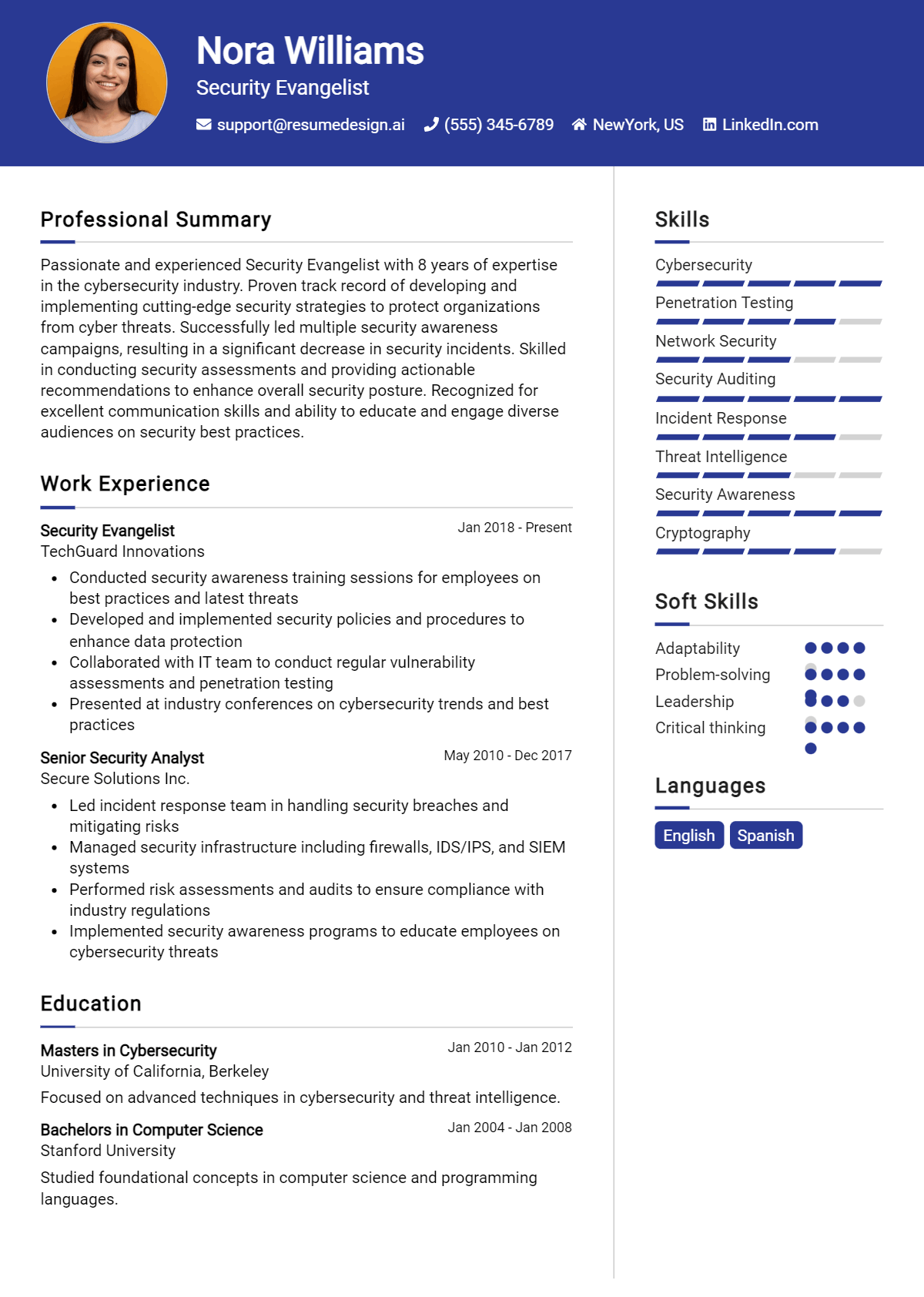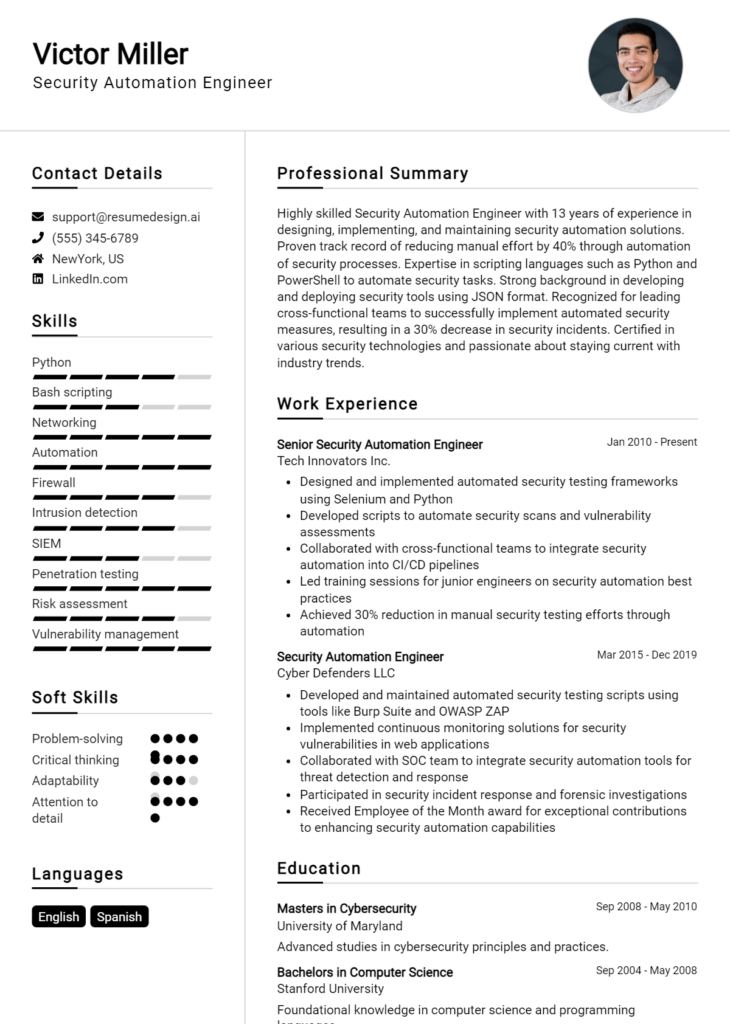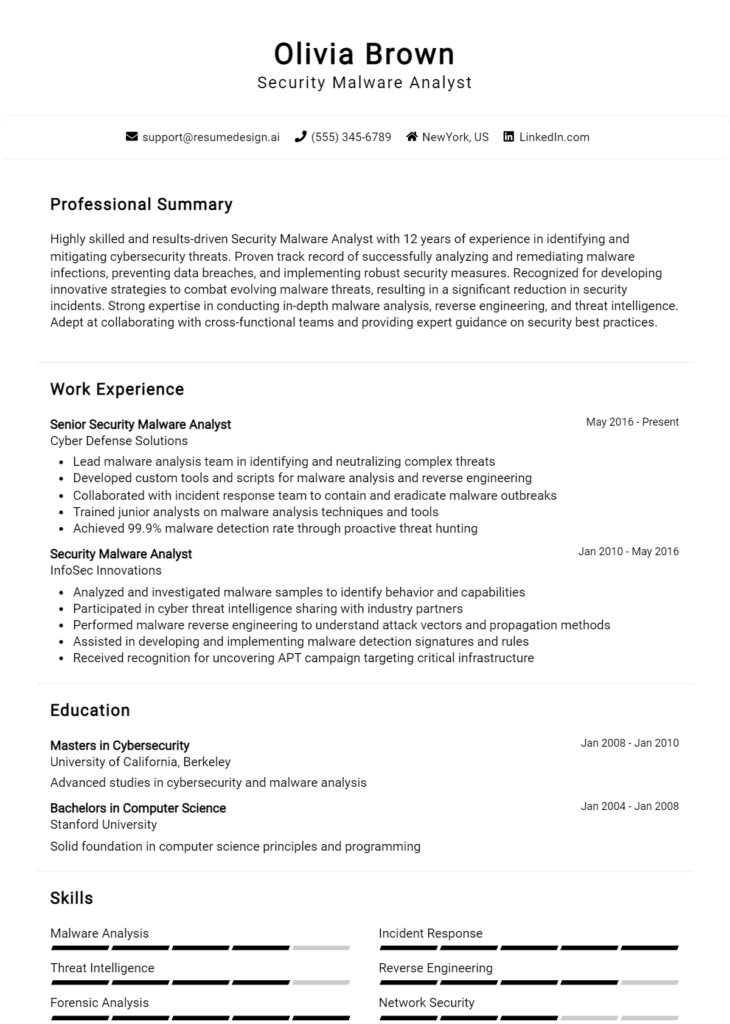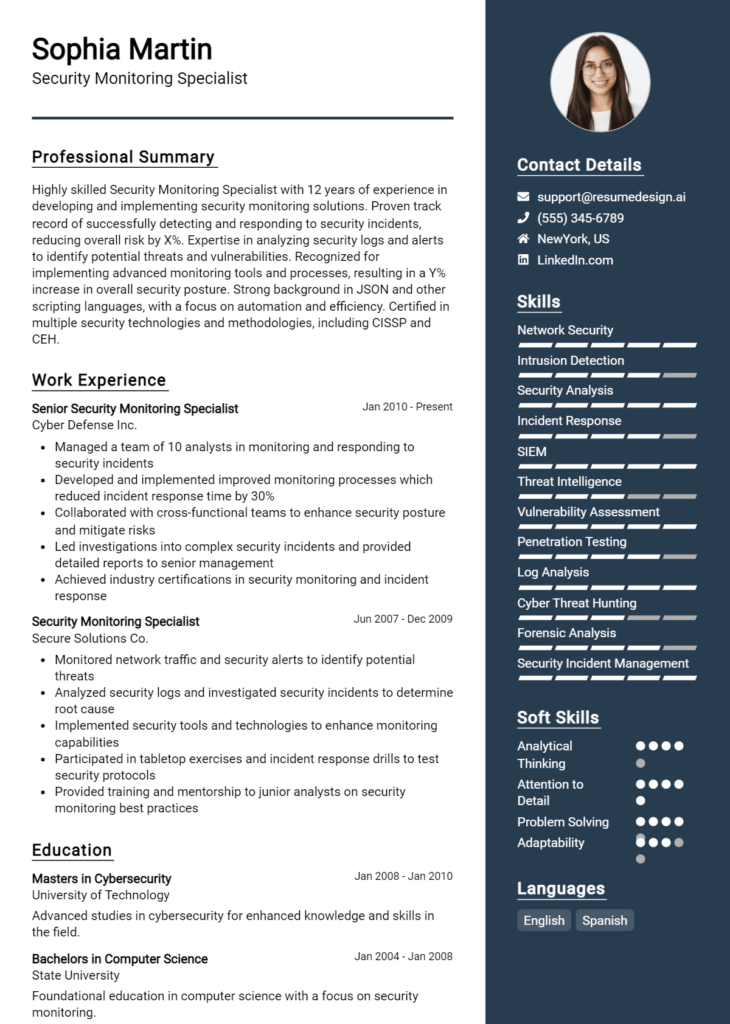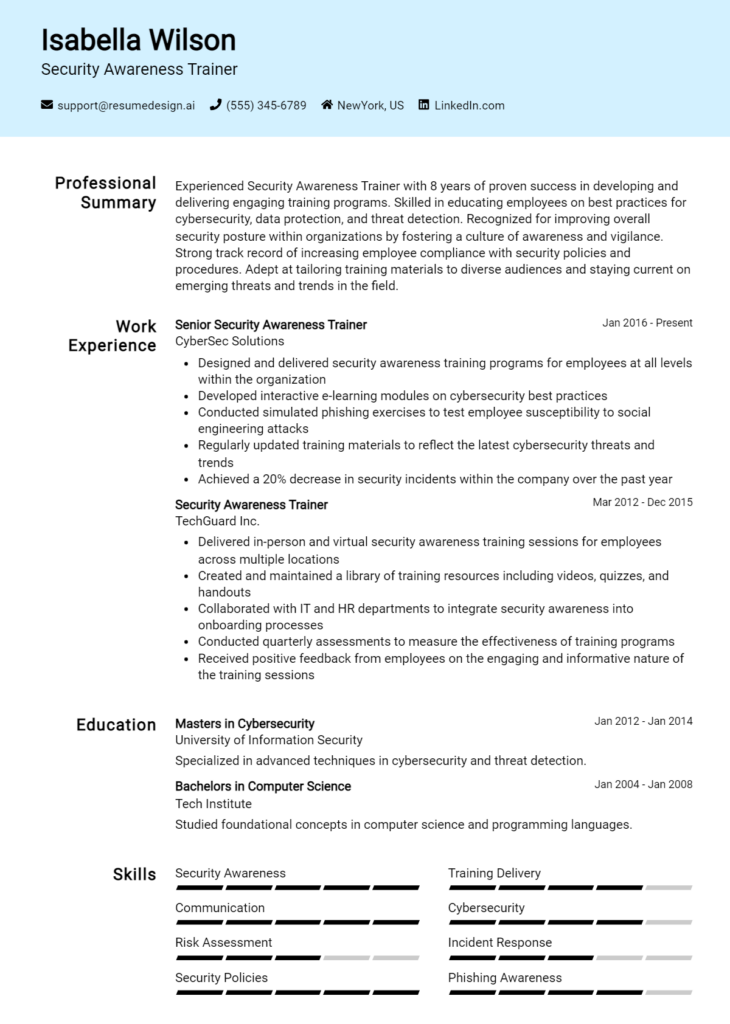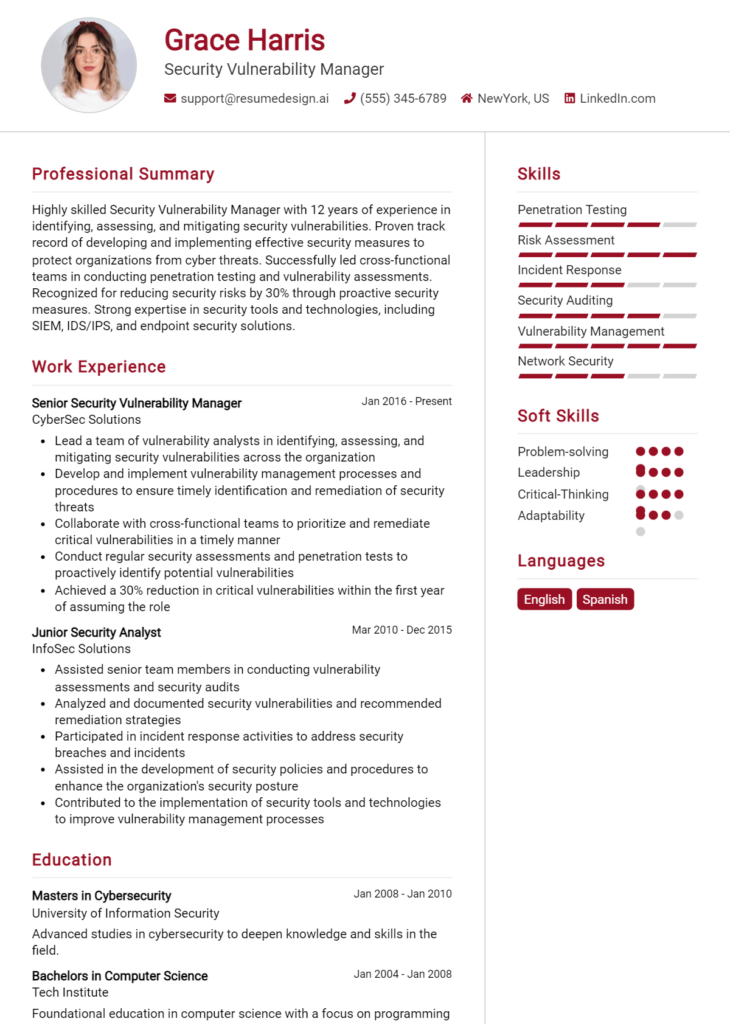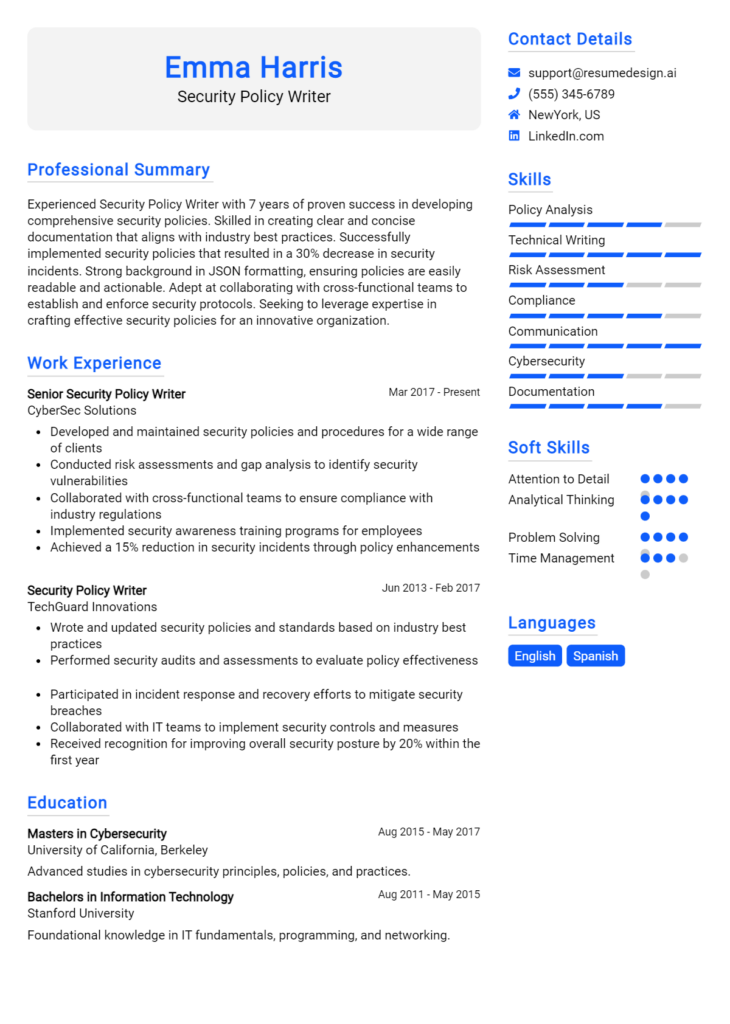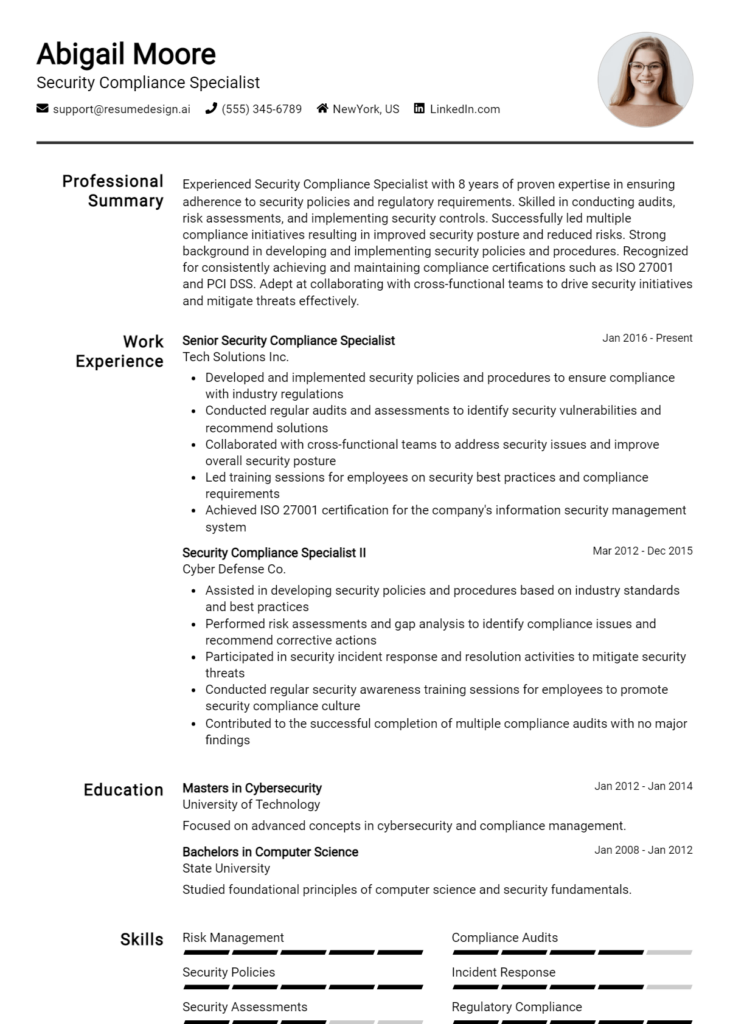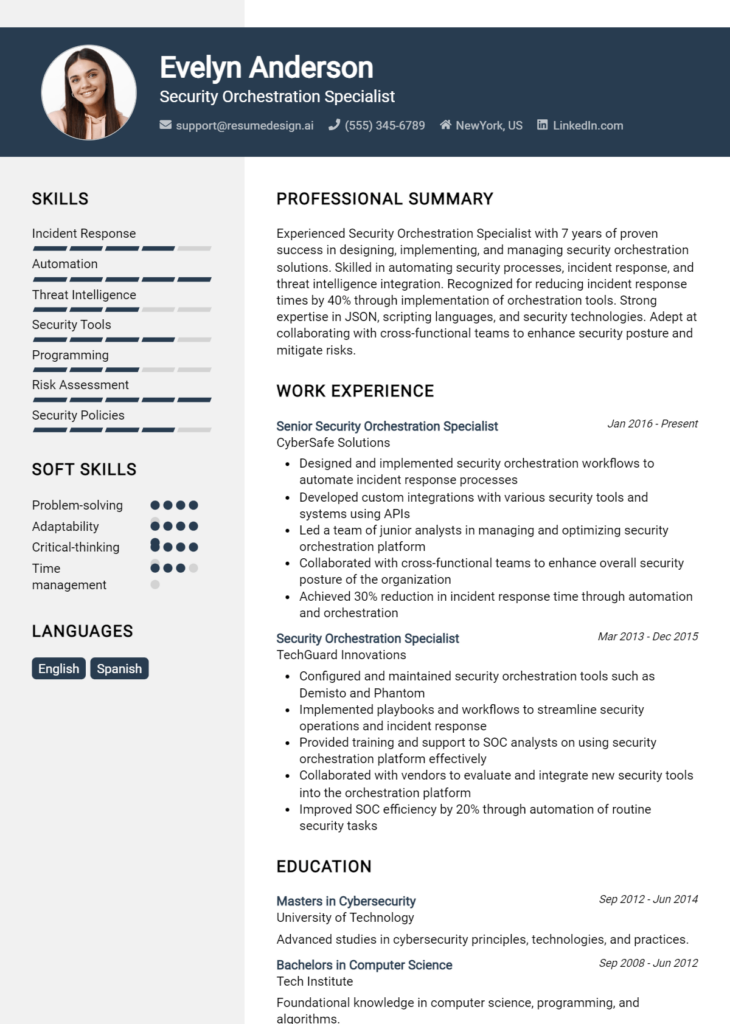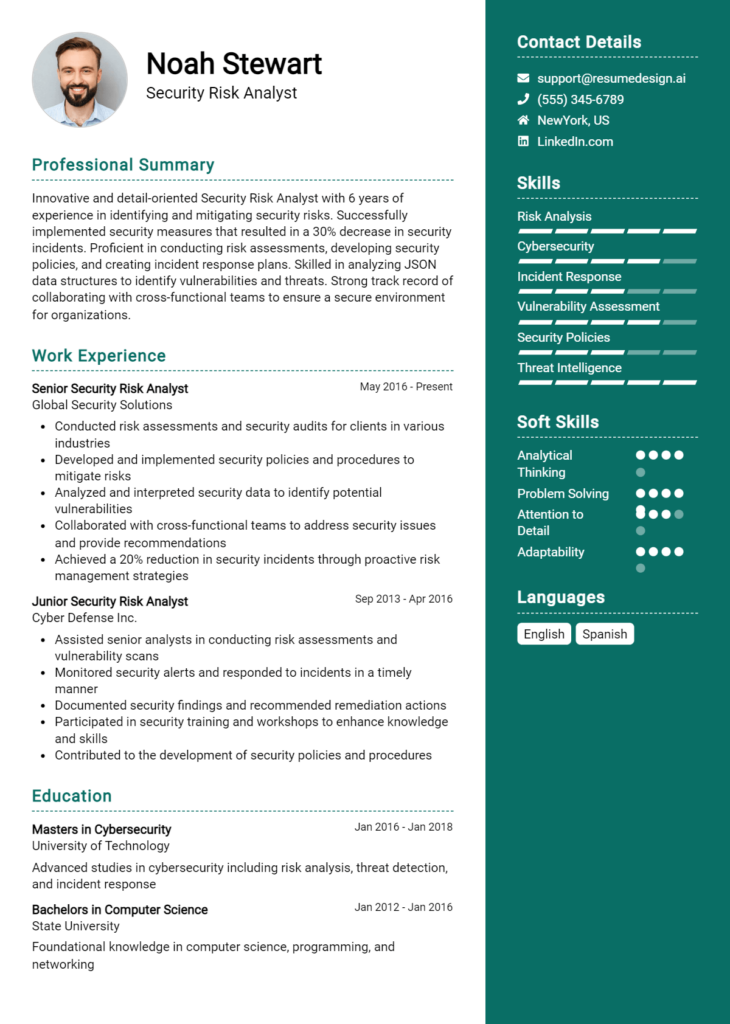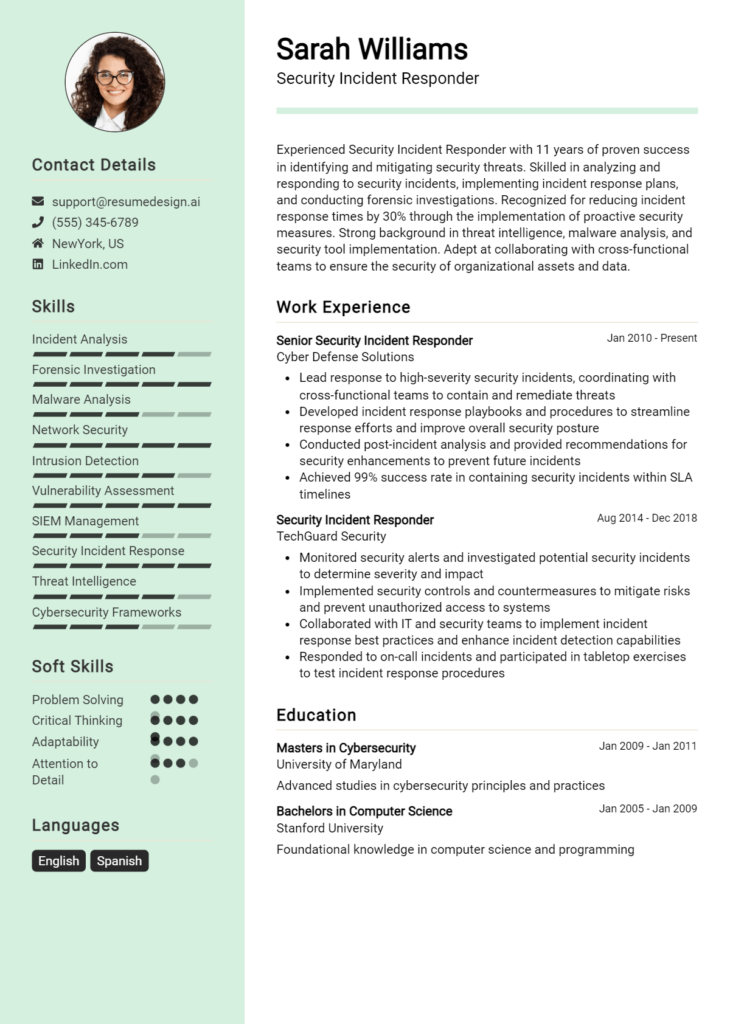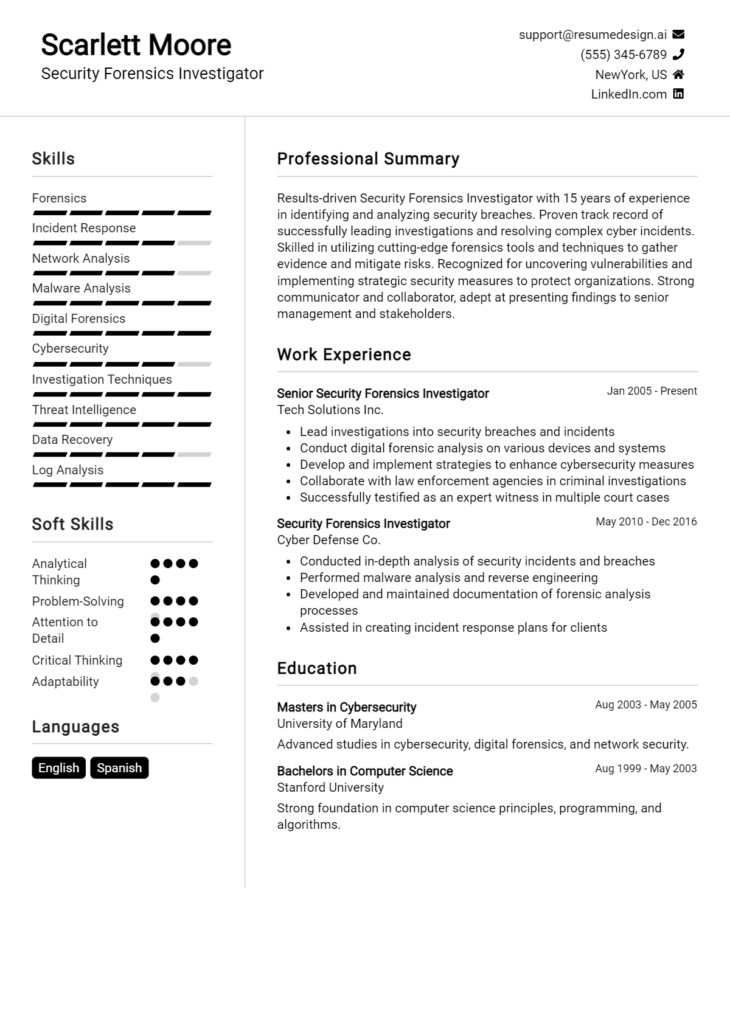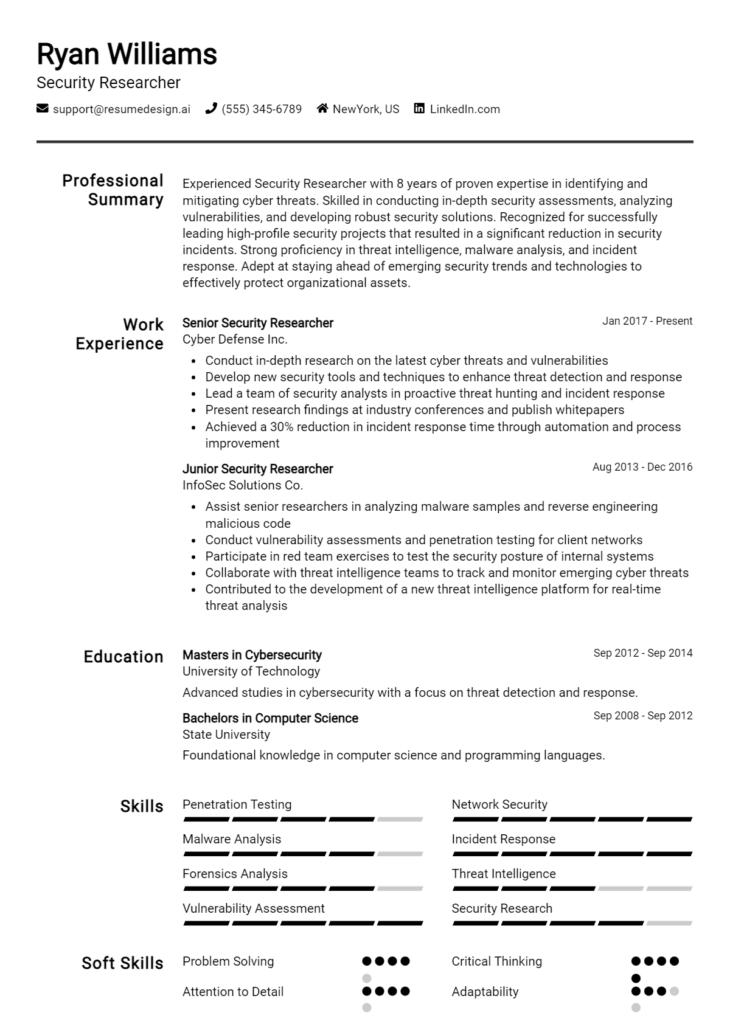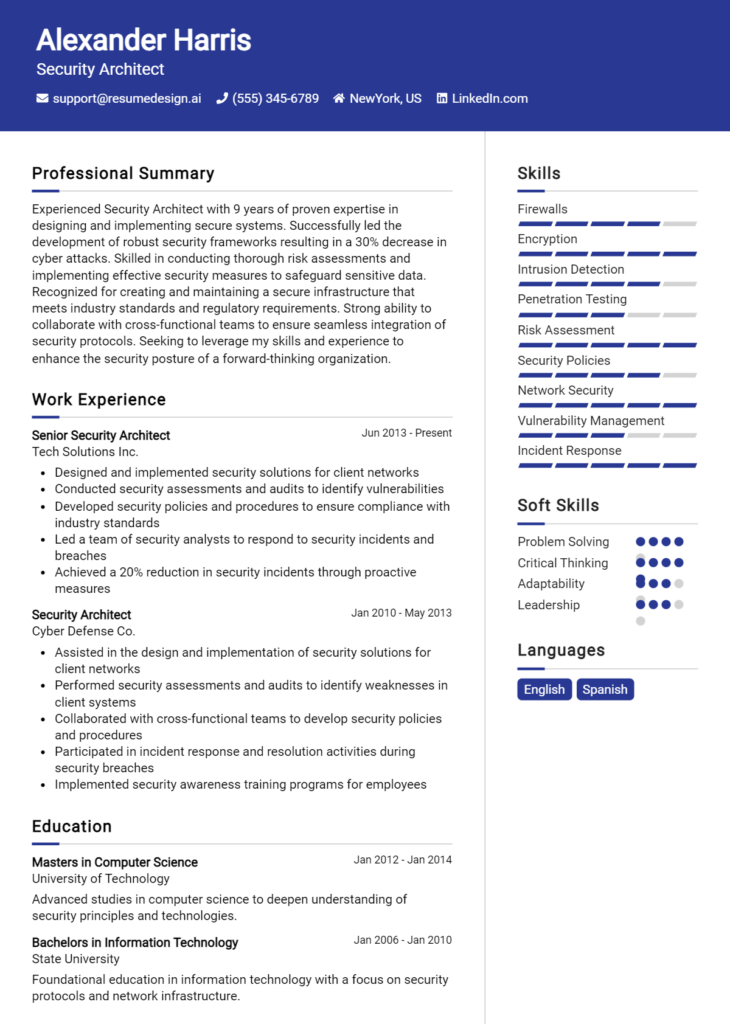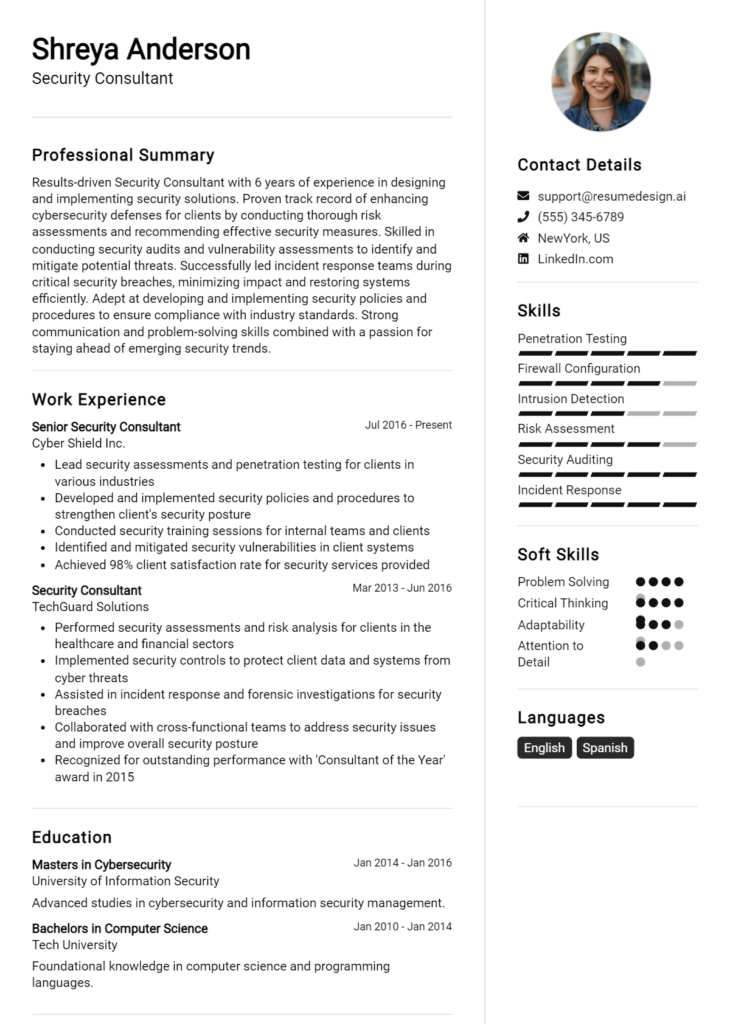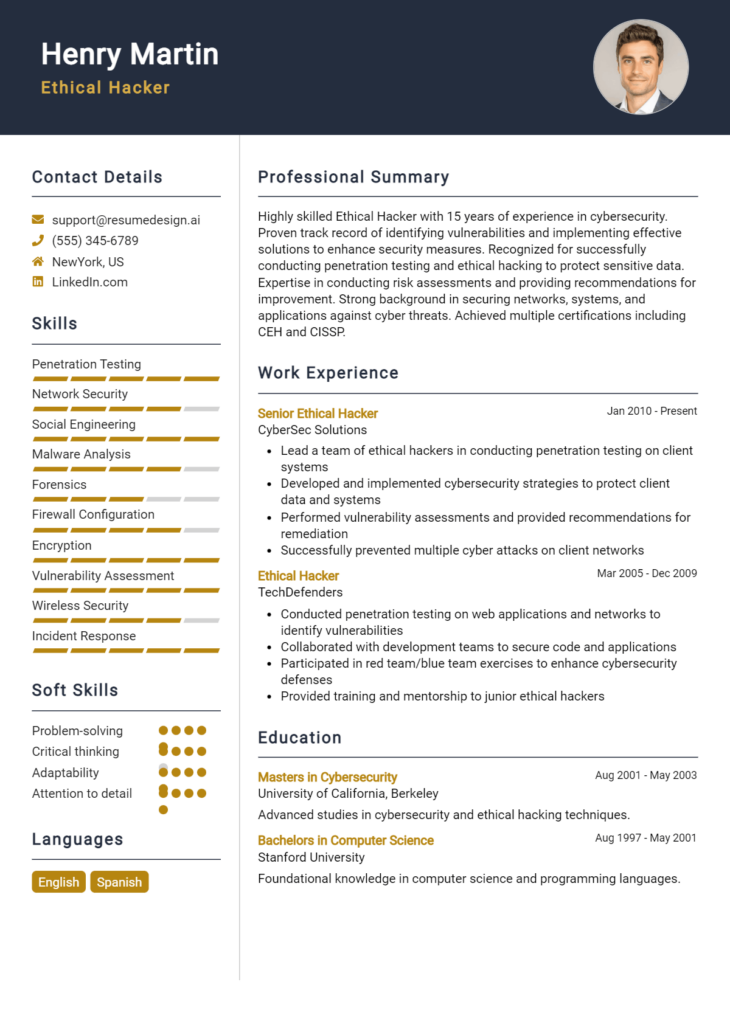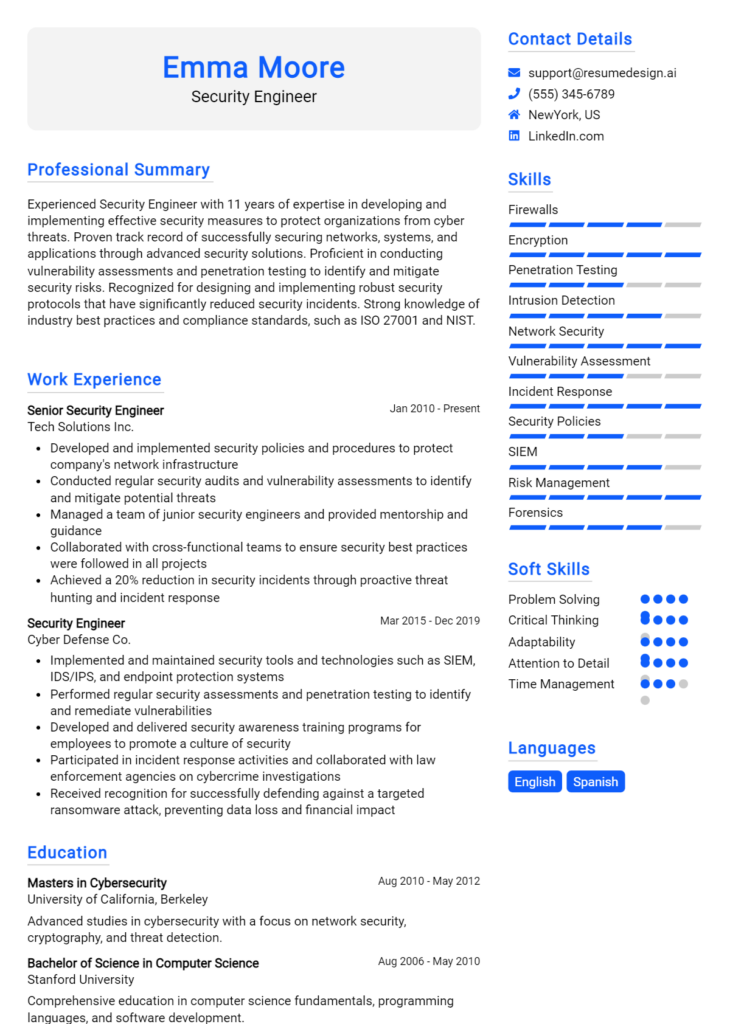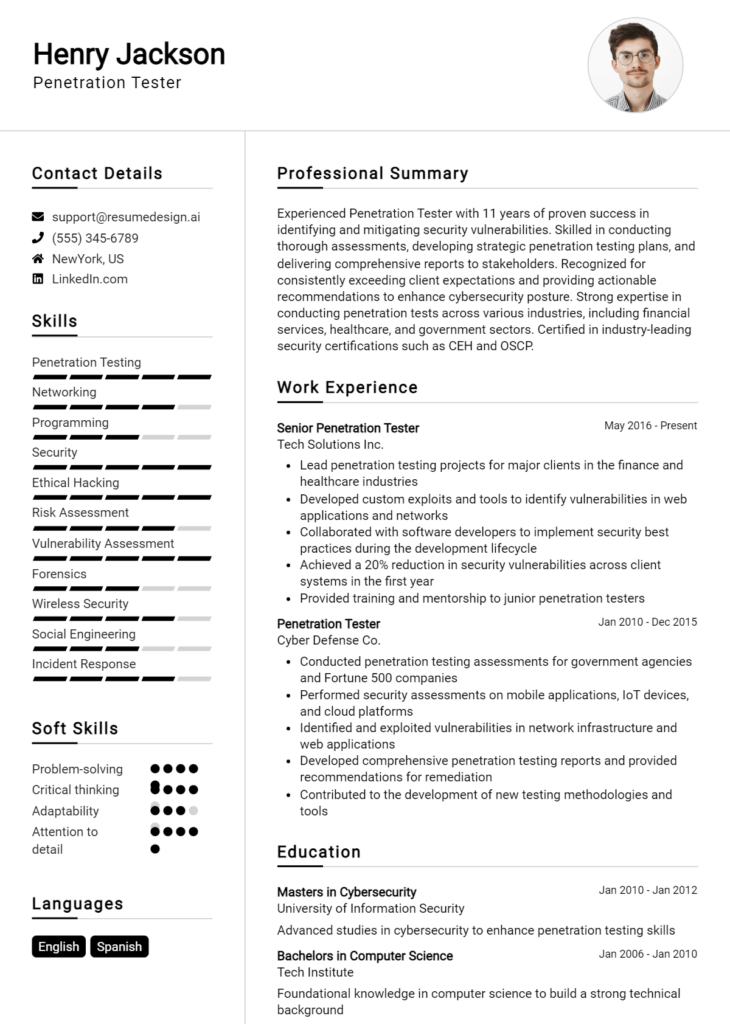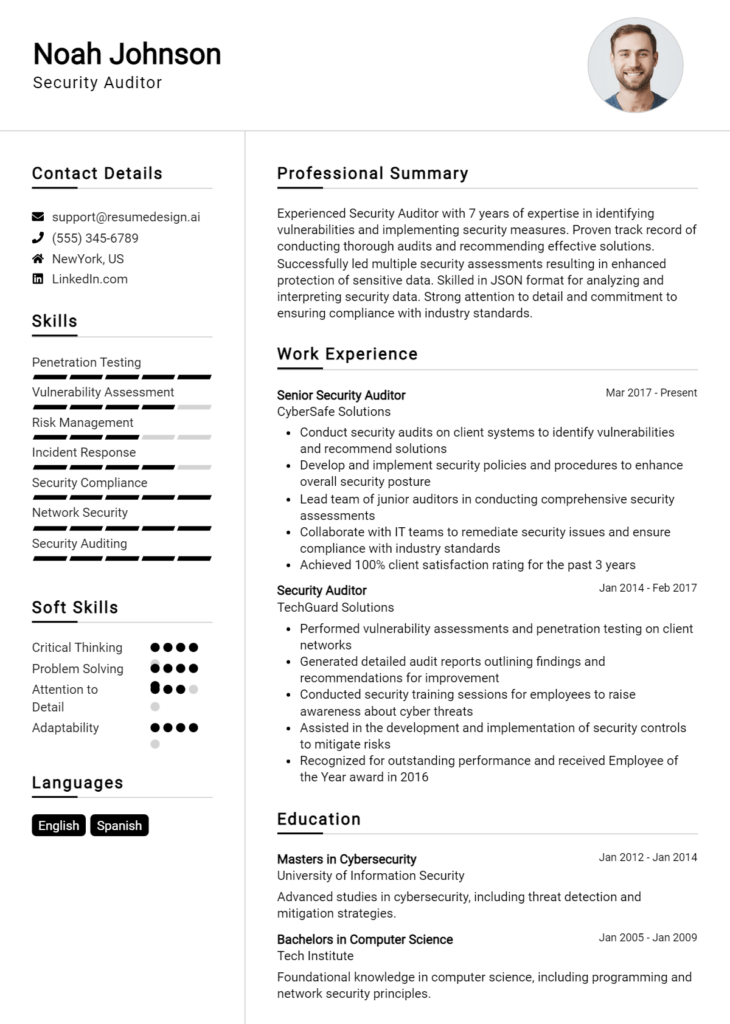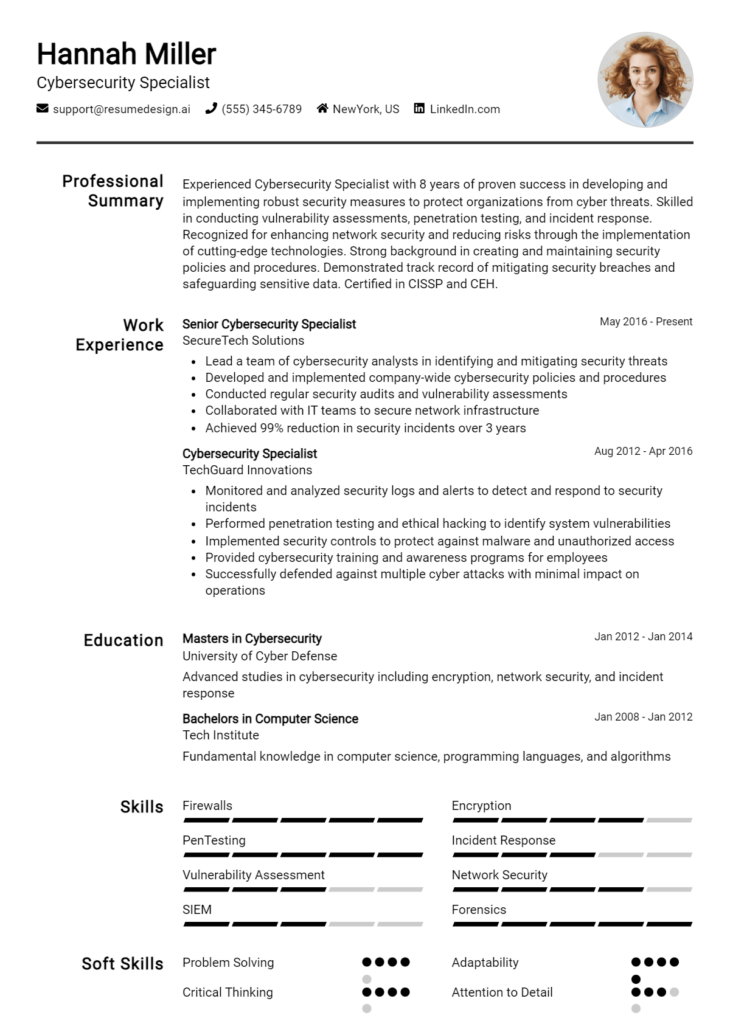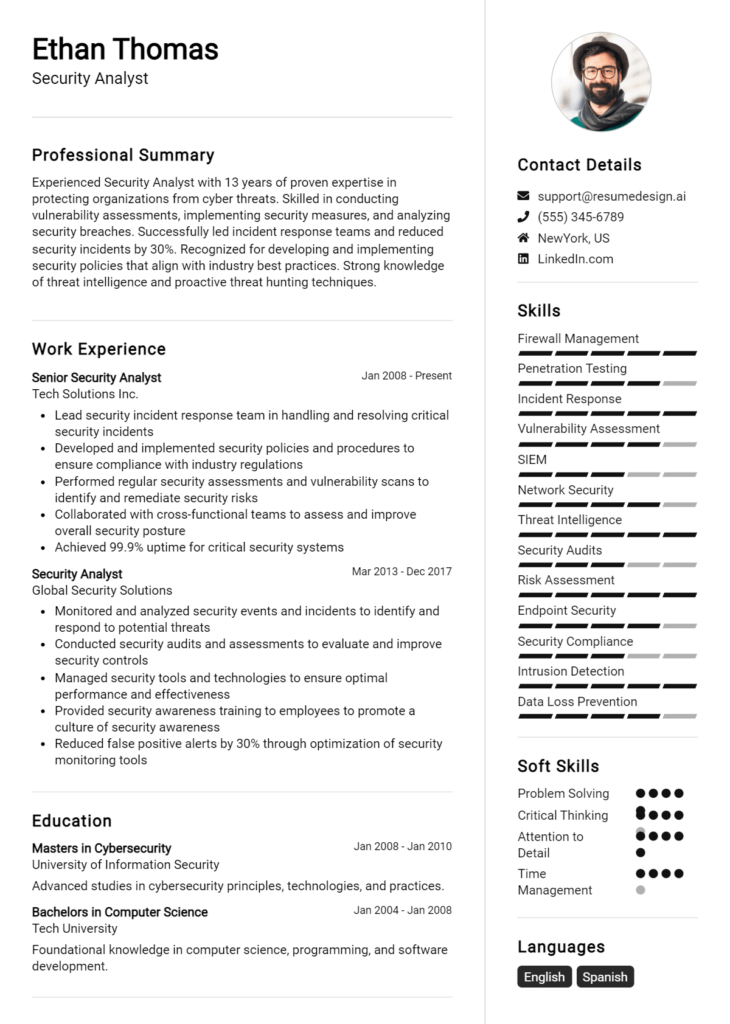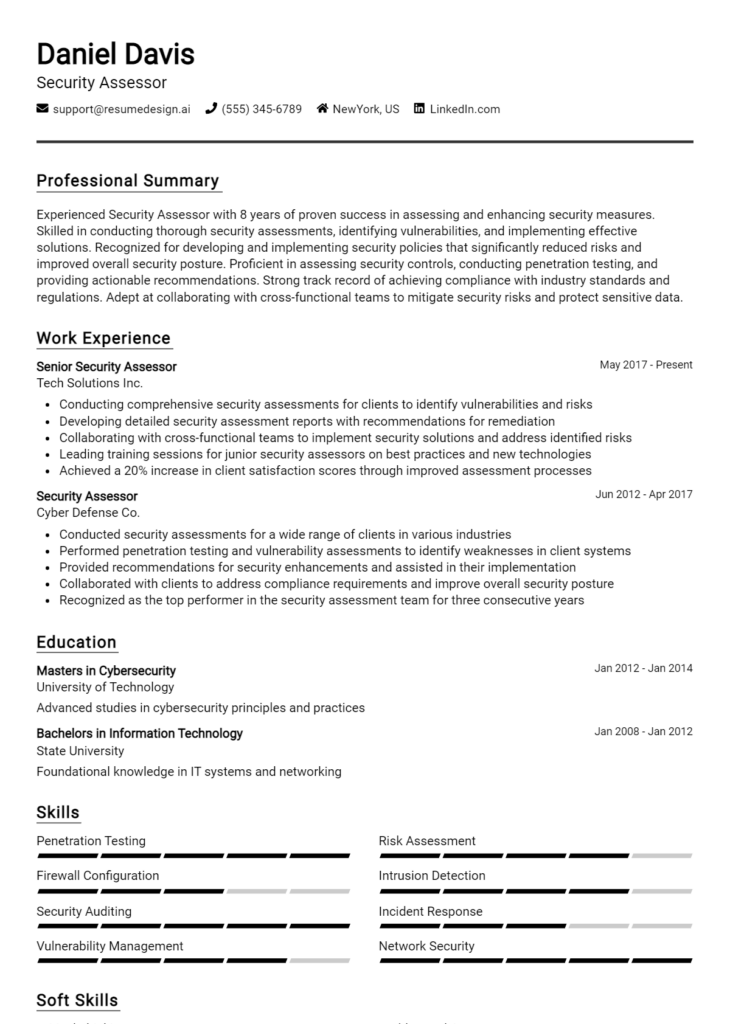Security Evangelist Core Responsibilities
A Security Evangelist plays a crucial role in bridging the gap between IT, security, and business functions within an organization. This professional is responsible for advocating security best practices, conducting training sessions, and developing awareness programs. Essential skills include strong technical knowledge, operational insight, and effective problem-solving abilities. These competencies help ensure security aligns with organizational goals. A well-structured resume can effectively showcase these qualifications, highlighting the candidate's ability to foster collaboration and drive security initiatives.
Common Responsibilities Listed on Security Evangelist Resume
- Develop and implement security awareness programs for employees.
- Conduct risk assessments and identify potential vulnerabilities.
- Collaborate with cross-functional teams to integrate security measures.
- Deliver presentations on security best practices and trends.
- Monitor and analyze emerging security threats and technologies.
- Provide guidance on compliance with security regulations.
- Engage in security incident response planning and execution.
- Foster a culture of security awareness across the organization.
- Build and maintain relationships with industry stakeholders.
- Create and distribute security-related content and resources.
- Facilitate training sessions for technical and non-technical staff.
High-Level Resume Tips for Security Evangelist Professionals
In the competitive field of cybersecurity, a well-crafted resume is essential for Security Evangelist professionals looking to make an impactful first impression on potential employers. Your resume serves as your personal marketing tool, showcasing not only your technical skills and experience but also your achievements that set you apart from other candidates. It must reflect your passion for security, your ability to communicate complex concepts, and your effectiveness in advocating for security best practices. In this guide, we will provide practical and actionable resume tips specifically tailored for Security Evangelist professionals to help you stand out in this dynamic industry.
Top Resume Tips for Security Evangelist Professionals
- Tailor your resume to match the specific job description by including relevant keywords and phrases that align with the employer's requirements.
- Highlight your experience in security awareness programs, training sessions, and community outreach initiatives to showcase your ability to educate and engage diverse audiences.
- Quantify your achievements with specific metrics, such as the percentage increase in security awareness or the number of employees trained, to demonstrate your impact.
- Include industry-specific certifications (e.g., CISSP, CISM, CEH) to validate your expertise and commitment to ongoing professional development.
- Showcase your ability to communicate complex security concepts clearly and effectively, emphasizing any public speaking or presentation experience.
- Provide examples of collaboration with cross-functional teams, illustrating your capability to work with IT, HR, and management to enhance organizational security posture.
- Incorporate a section on your thought leadership, such as published articles, blog posts, or speaking engagements at industry conferences.
- Utilize a clean, professional format that enhances readability, ensuring that important information stands out and is easy to find.
- Keep your resume concise, ideally one or two pages, focusing on the most relevant experiences and accomplishments to maintain the reader's attention.
By implementing these tips, you can significantly increase your chances of landing a job in the Security Evangelist field. A resume that effectively highlights your skills, experiences, and achievements not only captures the attention of hiring managers but also positions you as a strong candidate ready to contribute to the security landscape. With a polished resume, you can confidently move forward in your career, showcasing your commitment to promoting security awareness and best practices.
Why Resume Headlines & Titles are Important for Security Evangelist
In the competitive realm of cybersecurity, a Security Evangelist plays a pivotal role in promoting security awareness and best practices within an organization. The importance of resume headlines and titles for this position cannot be overstated; they serve as the first impression a hiring manager will have of a candidate. A strong headline or title can immediately grab attention and succinctly summarize a candidate's key qualifications in one impactful phrase. It should be concise, relevant, and directly related to the job being applied for, enabling the candidate to stand out in a sea of resumes.
Best Practices for Crafting Resume Headlines for Security Evangelist
- Keep it concise: Aim for a headline that is no longer than 10-12 words.
- Be role-specific: Tailor the headline to reflect the specific position of Security Evangelist.
- Highlight key skills: Incorporate vital skills or certifications relevant to the role.
- Use impactful language: Choose strong action words that convey competence and authority.
- Include numbers or metrics: Whenever possible, quantify achievements to add credibility.
- Avoid jargon: Make sure the language is clear and accessible to all readers.
- Reflect your unique value: Showcase what sets you apart from other candidates.
- Revise and refine: Continuously update the headline to align with current trends and job requirements.
Example Resume Headlines for Security Evangelist
Strong Resume Headlines
“Innovative Security Evangelist with 10+ Years in Cyber Defense”
“Passionate Advocate for Security Awareness with Proven Track Record”
“Cybersecurity Leader Specializing in Risk Management and Compliance”
“Dynamic Security Evangelist Driving Change through Education and Engagement”
Weak Resume Headlines
“Security Professional”
“Experienced in Cybersecurity”
“Looking for a Job in Security”
The strong headlines are effective because they immediately communicate the candidate's experience, specific skills, and unique contributions to the field of cybersecurity. They provide clarity and precision, helping to paint a picture of a qualified individual who can add value to a potential employer. In contrast, the weak headlines fail to impress because they lack specificity and do not convey the candidate’s unique qualifications or strengths, making them forgettable in a competitive job market.
Writing an Exceptional Security Evangelist Resume Summary
A well-crafted resume summary is crucial for a Security Evangelist as it serves as the first impression a hiring manager will have of a candidate. This brief section at the top of the resume quickly captures attention by succinctly showcasing key skills, relevant experience, and notable accomplishments that align with the specific demands of the role. A strong summary should be concise yet impactful, effectively setting the tone for the rest of the resume and compelling the reader to learn more about the candidate’s qualifications.
Best Practices for Writing a Security Evangelist Resume Summary
- Quantify Achievements: Use numbers and data to highlight your successes, such as reduced security incidents or improved compliance rates.
- Focus on Skills: Emphasize technical skills and knowledge areas that are critical for the role, such as risk assessment, incident response, and security awareness training.
- Tailor the Summary: Customize your summary for each job application, reflecting the specific requirements and keywords from the job description.
- Highlight Relevant Experience: Include your most pertinent work history that demonstrates your expertise in security practices and technologies.
- Keep it Concise: Aim for 3-5 sentences that deliver a powerful message without overwhelming the reader.
- Showcase Certifications: Mention any relevant certifications (e.g., CISSP, CISM) that validate your expertise in the security field.
- Use Action-Oriented Language: Start sentences with strong action verbs to convey confidence and proactivity.
- Reflect Passion for Security: Convey your enthusiasm for security and commitment to promoting best practices within the organization.
Example Security Evangelist Resume Summaries
Strong Resume Summaries
Dynamic Security Evangelist with over 8 years of experience in developing and implementing security awareness programs, resulting in a 50% reduction in security incidents across the organization. Proven ability to lead cross-functional teams in risk assessment and incident response, leveraging strong communication skills to foster a culture of security awareness.
Results-driven Security Evangelist with a track record of enhancing organizational security posture through innovative training initiatives and policy development. Achieved a 40% increase in employee participation in security training programs, leading to a significant improvement in overall compliance ratings.
Passionate Security Evangelist with extensive expertise in cybersecurity frameworks and threat mitigation strategies. Successfully led a team that conducted over 200 security audits, identifying vulnerabilities and implementing solutions that reduced potential risks by 60%.
Weak Resume Summaries
Experienced professional looking for a position in security. I have worked in various roles and have a good understanding of security processes.
Security Evangelist with some experience. I am dedicated and eager to contribute to a team focused on security initiatives.
The examples provided illustrate the key differences between strong and weak resume summaries. Strong summaries effectively quantify achievements, showcase relevant skills, and demonstrate a clear connection to the responsibilities of a Security Evangelist. In contrast, weak summaries lack specificity, fail to highlight measurable outcomes, and appear generic, ultimately making them less compelling to potential employers.
Work Experience Section for Security Evangelist Resume
The work experience section of a Security Evangelist resume is pivotal in demonstrating the candidate's foundational skills and expertise in the security domain. This section not only highlights technical competencies but also illustrates the candidate's ability to lead teams and drive the successful delivery of high-quality security products and initiatives. By quantifying achievements and aligning experiences with industry standards, candidates can effectively showcase their impact and value within the cybersecurity landscape, making this section a critical component of their overall presentation.
Best Practices for Security Evangelist Work Experience
- Highlight specific technical skills relevant to cybersecurity tools and frameworks.
- Use quantifiable metrics to demonstrate the impact of your work, such as percentage improvements or cost savings.
- Showcase leadership experiences, including team management and project oversight.
- Emphasize collaboration with cross-functional teams to highlight communication skills.
- Align your experience with current industry standards and best practices in cybersecurity.
- Include relevant certifications or training that enhance your qualifications.
- Detail projects that involved risk assessment, incident response, or security architecture.
- Use action verbs to convey accomplishments and responsibilities clearly.
Example Work Experiences for Security Evangelist
Strong Experiences
- Led a team of 10 cybersecurity professionals to reduce incident response time by 40%, enhancing the organization's overall security posture.
- Developed and executed a comprehensive security awareness training program, resulting in a 60% decrease in phishing incident reports over six months.
- Managed the implementation of a new security information and event management (SIEM) system, improving threat detection capabilities by 75%.
- Collaborated with development teams to integrate security best practices into the software development lifecycle (SDLC), reducing vulnerabilities by 50% in released products.
Weak Experiences
- Worked on various security projects without specifying outcomes or impacts.
- Assisted with team meetings and discussions related to security policies.
- Involved in cybersecurity tasks as needed.
- Participated in training sessions and workshops.
The examples listed above are considered strong because they provide specific, quantifiable outcomes that demonstrate the candidate's technical expertise and leadership abilities in security. Each bullet clearly articulates contributions to the organization, showcasing a measurable impact. Conversely, the weak experiences lack detail and do not convey any significant achievements or responsibilities, making them less effective in highlighting the candidate's qualifications for a Security Evangelist role.
Education and Certifications Section for Security Evangelist Resume
The education and certifications section of a Security Evangelist resume is crucial as it serves to showcase the candidate's academic qualifications, industry-relevant certifications, and commitment to continuous learning in the field of cybersecurity. This section not only highlights the foundational knowledge that supports the candidate's expertise but also demonstrates their proactive approach to staying updated with the latest security trends and best practices. By including relevant coursework, specialized training, and recognized certifications, candidates can significantly bolster their credibility and illustrate their alignment with the demands of the Security Evangelist role.
Best Practices for Security Evangelist Education and Certifications
- Focus on relevance: Include degrees and certifications that are directly applicable to the cybersecurity and security evangelism fields.
- Provide specific details: List the names of institutions, dates of completion, and any honors received to enhance credibility.
- Highlight advanced credentials: Prioritize advanced degrees (e.g., Master's in Cybersecurity) and industry-recognized certifications (e.g., CISSP, CEH).
- Showcase continuous education: Include any recent courses, workshops, or training that demonstrate ongoing professional development.
- Utilize keywords: Incorporate industry-standard terminology and phrases to improve visibility in applicant tracking systems.
- Be concise but informative: Keep descriptions brief while ensuring they provide sufficient context about the relevance of the education and certifications.
- Avoid redundancy: Ensure that each entry adds unique value and avoid listing qualifications that are overly similar.
- Order strategically: Place the most relevant and impressive qualifications at the top of the list to catch the reader's attention.
Example Education and Certifications for Security Evangelist
Strong Examples
- Master of Science in Cybersecurity, University of Information Technology, 2022
- Certified Information Systems Security Professional (CISSP), (ISC)², 2023
- Certified Ethical Hacker (CEH), EC-Council, 2021
- Coursework in Cybersecurity Policy and Risk Management, Harvard Online, 2023
Weak Examples
- Bachelor of Arts in English Literature, University of Arts, 2010
- Certification in Microsoft Office Suite, 2015
- Course on Basic Computer Skills, Community College, 2018
- High School Diploma, Graduated 2006
The examples provided highlight the importance of relevance and timeliness in educational qualifications and certifications. Strong examples are aligned with the field of cybersecurity, showcasing advanced degrees and industry-recognized certifications that are essential for a Security Evangelist. In contrast, the weak examples illustrate qualifications that lack relevance to the role, such as degrees in unrelated fields or outdated certifications, which do not contribute to the candidate's credibility in the cybersecurity landscape.
Top Skills & Keywords for Security Evangelist Resume
As a Security Evangelist, possessing a robust set of skills is paramount to effectively communicate the importance of cybersecurity practices to diverse audiences. A well-crafted resume that highlights both hard and soft skills can significantly enhance your candidacy, demonstrating your technical proficiency as well as your ability to engage, educate, and inspire others. Emphasizing these skills will not only showcase your qualifications but also reflect your commitment to fostering a secure digital environment.
Top Hard & Soft Skills for Security Evangelist
Soft Skills
- Excellent communication skills
- Public speaking and presentation abilities
- Strong interpersonal skills
- Persuasion and negotiation techniques
- Adaptability and flexibility
- Problem-solving skills
- Analytical thinking
- Team collaboration
- Empathy and emotional intelligence
- Leadership and mentoring capabilities
- Creativity in approach to security challenges
- Active listening
- Conflict resolution
- Networking and relationship building
- Time management
Hard Skills
- Knowledge of cybersecurity frameworks (e.g., NIST, ISO)
- Proficiency in security tools and technologies
- Understanding of risk assessment methodologies
- Familiarity with compliance regulations (e.g., GDPR, HIPAA)
- Experience with penetration testing and vulnerability assessments
- Ability to develop and implement security policies
- Incident response and management skills
- Expertise in threat intelligence
- Knowledge of cloud security practices
- Familiarity with network security protocols
- Data privacy and protection strategies
- Competence in security architecture design
- Proficiency in scripting languages (e.g., Python, PowerShell)
- Understanding of malware analysis
- Cybersecurity awareness training development
- Experience in security audits and assessments
- Knowledge of secure software development practices
By integrating these skills into your resume, you can better communicate your qualifications. Additionally, highlighting your relevant work experience will further strengthen your profile as a Security Evangelist.
Stand Out with a Winning Security Evangelist Cover Letter
Dear Hiring Manager,
I am excited to apply for the Security Evangelist position at [Company Name], as advertised on your careers page. With a robust background in cybersecurity and a passion for educating others about the importance of digital safety, I believe I would be a valuable asset to your team. My experience in both technical and non-technical environments has equipped me with the skills necessary to communicate complex security concepts effectively to diverse audiences.
In my previous role at [Previous Company Name], I successfully led initiatives to enhance security awareness across the organization. I developed and delivered engaging training sessions that empowered employees to adopt best practices in cybersecurity. By leveraging my expertise in threat analysis and risk assessment, I was able to create tailored content that resonated with various departments, ultimately fostering a culture of security mindfulness. My ability to translate technical jargon into relatable language has not only improved compliance but also encouraged proactive behaviors among staff.
Moreover, I am adept at collaborating with cross-functional teams to align security initiatives with organizational goals. I have a proven track record of building relationships with stakeholders, which has been vital in driving security projects forward. At [Previous Company Name], I played a key role in launching a security awareness campaign that resulted in a 30% reduction in phishing incidents within six months. I thrive in environments that challenge me to innovate and inspire, and I am eager to bring this mindset to [Company Name].
I am excited about the opportunity to contribute to [Company Name] as a Security Evangelist and help shape a more secure future for your organization. I look forward to the possibility of discussing my application further and exploring how my skills and experiences align with your needs. Thank you for considering my candidacy.
Sincerely,
[Your Name]
[Your Contact Information]
Common Mistakes to Avoid in a Security Evangelist Resume
In the competitive field of cybersecurity, crafting an effective resume as a Security Evangelist is crucial for standing out among other candidates. However, many applicants make common mistakes that can undermine their chances of landing an interview. Below are key pitfalls to avoid when preparing your resume to ensure it accurately reflects your expertise and aligns with industry expectations.
Lack of Tailoring: Failing to customize your resume for each job application can make it seem generic. Highlight specific skills and experiences that match the job description to demonstrate your fit for the role.
Ignoring Technical Skills: A Security Evangelist should possess a strong technical background. Omitting relevant tools, technologies, or certifications can leave hiring managers questioning your qualifications.
Overloading with Jargon: While industry terminology is important, overusing jargon can make your resume difficult to read. Strive for clarity by balancing technical language with straightforward explanations.
Neglecting Soft Skills: Communication and interpersonal skills are crucial for a Security Evangelist. Focusing solely on technical abilities without showcasing your ability to engage with diverse audiences can weaken your application.
Using Passive Language: A resume should reflect your proactive contributions. Phrases like "responsible for" can be replaced with action-oriented language such as "led," "developed," or "implemented" to convey your impact more effectively.
Omitting Quantifiable Achievements: Employers appreciate concrete results. Failing to include metrics or specific outcomes from your previous roles can result in a less compelling narrative about your effectiveness.
Inconsistent Formatting: A disorganized or inconsistent layout can detract from the professionalism of your resume. Ensure uniform font sizes, bullet points, and section headings for a polished appearance.
Skipping a Summary Statement: A well-crafted summary at the top of your resume helps to quickly convey your value proposition. Neglecting this section can mean missing an opportunity to grab the attention of hiring managers right away.
Conclusion
In today's digital landscape, the role of a Security Evangelist is more crucial than ever. As organizations strive to safeguard their assets and information, the Security Evangelist stands at the forefront, advocating for best practices in security measures and promoting a culture of awareness among employees. Key responsibilities include educating stakeholders about potential security threats, developing comprehensive security strategies, and collaborating with various teams to ensure robust protection against cyber threats.
A successful Security Evangelist possesses a deep understanding of security protocols, excellent communication skills, and the ability to translate complex security concepts into actionable insights. Furthermore, staying abreast of the latest trends and technologies in cybersecurity is essential for effectively engaging and influencing others within the organization.
As you reflect on the insights shared in this article, consider reviewing your own Security Evangelist resume. Highlight your unique skills, experiences, and achievements that make you a valuable asset in this field. To assist you in this process, take advantage of various resources available, such as resume templates, a user-friendly resume builder, curated resume examples, and professional cover letter templates. Invest time in refining your resume and cover letter to effectively showcase your expertise and commitment to security. Your next opportunity could be just around the corner!

